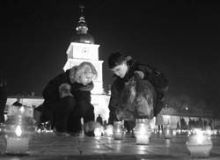The House of Representatives of the US Congress has passed a resolution authorizing the Ukrainian government to erect a monument in Washington to the victims of the 1932-1933 Holodomor, Ukrainski novyny reports. The House Secretariat announced that the government of Ukraine has obtained permission to erect the memorial on a federally owned plot of land in downtown Washington. The bill also underlines that “the United States Government shall not pay any expenses to create or support the memorial.”
“In the years 1932-1933, Ukraine was ravaged and its people brought to the verge of physical extinction by a famine caused not by natural causes such as pestilence, drought, floods, or poor harvest, but as a consequence of a premeditated policy on the part of the Soviet Government led by Joseph Stalin to crush the nationally conscious Ukrainian people and destroy their national, political, cultural, and religious rights,” the resolution says.
In 1986 the US Congress appointed a special commission to investigate the causes of the famine and arrived at the conclusion that the actions of the Soviet government can be considered an act of genocide. Two years ago, on the initiative of the then government of Ukraine, over 30 states, including the US, signed a joint statement in the UN to honor the memory of those who died as a result of the famine. “In the former Soviet Union, millions of men, women, and children fell victim to the cruel actions and policies of a totalitarian regime. The great famine of 1932-1933 (Holodomor) claimed the lives of seven to ten million innocent people and became the national tragedy of the Ukrainian people,” the statement says.
If the new memorial is erected, Washington will have two Ukrainian monuments. In 1964, by a special resolution of the US Congress and with assistance from the Ukrainian Diaspora, a statue was erected in the US capital’s center to the great Ukrainian poet Taras Shevchenko, who drew inspiration from “the great American tradition to struggle against the imperial and colonial occupation of his Fatherland,” the Congressional resolution read. The eight-meter-high 45-ton bronze monument on a granite pedestal was solemnly unveiled by former US President Dwight Eisenhower in the presence of about 100,000 officials and guests. The resolution also says that Ukrainians all over the world plan to mark the 75 th anniversary of the Holodomor with various ceremonies to pay tribute to the victims of the tragedy. By 2007 Ukraine will draw up a UN document on recognizing the 1932-1933 Holodomor in Ukraine as an act of genocide. In 2003 the Verkhovna Rada of Ukraine pronounced the Holodomor an act of genocide. Twenty-five UN member states have already prepared a joint declaration in which they call the Holodomor in Ukraine the result of the policy of a totalitarian regime.
In 2003 the National Assembly (parliament) of Hungary passed a resolution to the effect that the 1932-1933 Holodomor in Ukraine was a premeditated and prearranged action of the Stalinist Soviet system. In late October 2003 the Senate (upper house of parliament) of Australia resolved to consider the Holodomor a manifestation of genocide in human history. Before that, the House of Representatives (lower chamber) of the US Congress pronounced the Holodomor a mass murder. The parliaments of Canada and Argentina have also condemned the Holodomor. The 1932-1933 manmade famine in Ukraine claimed an estimated seven to ten million human lives, or 10 to 25 percent of the total population, including several million children.







